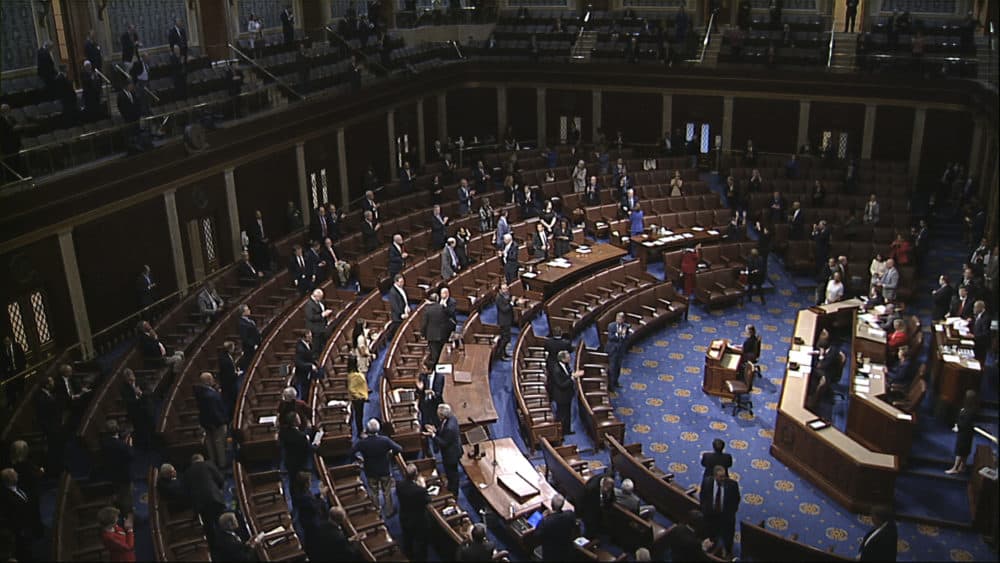Advertisement
The $2 Trillion Federal Stimulus Plan Will Help Massachusetts, But Lawmakers Say It's Only A Start.

The U.S. House of Representative approved a massive financial stimulus bill on Friday that was passed unanimously by the Senate. The bill now goes to President Trump, who's expected to sign it into law to help the country weather the devastating financial impact of the coronavirus epidemic.
It is the largest stimulus bill ever to come out of Congress. The $2 trillion spending plan will deliver cash payments to millions of Massachusetts residents, extend unemployment benefits, help small businesses stay open and give generous help to large corporations. It also delivers direct help to states, who badly need it, a point made earlier this week by Massachusetts Gov. Charlie Baker.
"Make a deal. Make a deal," said Baker, imploring the U.S. Senate to get it done. "I think it's critical that these folks find a way to yes — not just for state and local governments but for the people of the country."
The Senate finally made a deal. It includes $350 billion in no-fee loans and billions more in grants and extended unemployment insurance for workers. The spending plan delivers substantial help for small businesses across Massachusetts. In a tele-conference Thursday with state business owners, Sen. Elizabeth Warren called the spending package "an unprecedented response to an unprecedented crisis."
"It reflects an understanding in Washington about the importance of small businesses in dealing with this crisis and also in promoting a recovery and coming out the other side," Warren said.
The loans will help Massachusetts businesses meet payroll, cover rent and utilities — and they will not have to be repaid if companies maintain their workforce. The plan also includes $450 billion to help large corporations — which Warren is less happy about.
"I don't believe the price of getting help to small businesses and families should be a $450 billion dollar slush fund for big corporations," Warren said on Thursday.
But Warren called that a necessary compromise with Senate Republicans, and said that she pushed for and got as much oversight as possible into that part of the bill.
Under the plan, most Massachusetts residents will get cash payments of $1,200 directly from the government. Couples will get $2,400, plus another $500 per child. Those payments will go to residents who earn up to $75,000 a year, or couples making up to $150,000 year. Payments decrease if they earn more.
Advertisement
The cash payments provide immediate help to many Massachusetts families.
"It's a good starting point to help the American people right now, and to help the people of Massachusetts," said Marie-Frances Rivera, president of the Massachusetts Budget and Policy Center.
Rivera and her analysts are still figuring out how much of the $2 trillion will come to Massachusetts — but it will be in the billions of dollars. It's a huge amount of federal spending, but Rivera says it leaves some people behind, including undocumented immigrants, many of whom are now out of work.
In addition, Rivera says the federal plan directs $3.5 billion to shore up the cost of child care across the nation — but she worries that Massachusetts' share won't be enough.
"The child care system in Massachusetts is already fragile, and we're going to need support to make sure it's shored up and that kids are supported when we all step out of this quarantine," she said.
While the spending plan offers cash payments and extends jobless benefits, Rivera says it will only begin to address a huge unemployment challenge in the state. She estimates that about 16% of Massachusetts residents have already lost their jobs.
Since the pandemic hit the state, hundreds of thousands of residents have filed unemployment claims — a 20-fold increase just in the last week.
"This is going to be one of the biggest challenges that states are going to face over the next several weeks," Baker said on Thursday.
The dramatic unemployment surge in Massachusetts is why many advocates and lawmakers in the state say more federal help — beyond the stimulus plan — is needed. Among them is Rep. Joe Kennedy, who filed legislation this week to provide additional cash payments to individuals: $4,000 to those making less than a $100,000 per year; and $2,000 to those making more than that.
"The point on this is to provide some clarity, some reassurance, that if you can't go to work, it doesn't mean that you're going to be faced with financial devastation," Kennedy said. "You'll have some extra money to make sure that you can pay your bills: your rent, your mortgage, your car payments, your prescription drugs."
The federal stimulus plan also provides support for local hospitals, which are expected to come under enormous strain as the number of infections increases across Massachusetts.
“As this outbreak continues to accelerate, hospitals are grateful for the short-term financial assistance provided by the federal government and ongoing efforts to secure additional support for hospitals at the state level," said a statement from Massachusetts Health & Hospital Association (MHA).
The MHA anticipates the cancellation of elective surgeries and the decline in outpatient visit volume will cost Massachusetts hospitals more than $750 million a month.
"For many community and safety net hospitals, which were already operating on razor-thin margins, these losses represent a very real threat to their survival," according to the statement from MHA, which says its members will need a lot more support for the long haul.
Many in Massachusetts, including health care workers, advocates and elected officials, say that as huge and unprecedented as the $2 trillion stimulus plan is, it's only a start, given the enormity of the challenge faced by the states.
This segment aired on March 27, 2020. The audio for this segment is not available.
